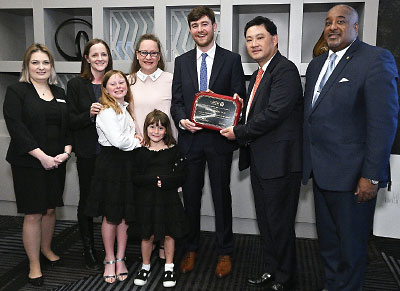APA Recognizes Inaugural O’Leary Award Winner
Abstract
Declan Grabb, M.D., a psychiatry resident at Northwestern, has developed an AI-based program that provides succinct patient summaries to psychiatrists to help streamline the patient intake session.
As wait lists for mental health professionals grow longer, clinics have started to experiment with ways to streamline appointments.
Declan Grabb, M.D., a rising 4th year psychiatry resident at Northwestern Memorial Hospital, knows well the pressure to squeeze the most value out of limited time. He wondered: What if artificial intelligence (AI) could help arm psychiatrists with critical information about their patients before they sit down for their first appointment?
Grabb developed an idea for an AI program that could convert patient narratives about their health (filled out prior to the appointment) into succinct health summaries for mental health professionals, so that they could start targeting important symptoms right away.

Declan Grabb, M.D. (holding award plaque), is photographed with (from left) Vedrana Hodzic, M.D., director of Fellowships and Medical Education in the APA Foundation; Nina Kraguljac, M.D., a member of the O’Leary Award Endowment Committee and close friend of the O’Learys; Malinda O’Leary, Ph.D., with daughters Sophia and Sylvia; Ray Hsiao, M.D., a member of the APA Foundation’s board; and Rawle Andrews Jr., Esq., executive director of the APA Foundation.
The clever simplicity and clinical potential of this idea was recognized by APA, which awarded Grabb the inaugural O’Leary Award for Innovation in Psychiatry. The award provides $5,000 in seed money to launch business ideas that improve the efficiency of behavioral health care teams, improve and expand access to services, and more.
“I remember being on a train when I got the email about the award and I could barely contain my excitement,” Grabb said. “I always aim for the stars, but I never think I will actually reach them.”
The O’Leary Award was established by the APA Foundation in 2022 in memory of the late Paul O’Leary, M.D., who served in numerous positions at APA, including Assembly speaker and a member of the APA delegation to AMA.
Grabb was recognized during a ceremony at this year’s Annual Meeting. O’Leary’s wife, Malinda O’Leary, Ph.D., and daughters, Sophia and Sylvia, joined APA CEO and Medical Director Saul Levin, M.D., M.P.A., to present Grabb with the award plaque.
“I want to convey my gratitude to the O’Leary family who provided the seed which spurred an academic interest I will carry forward the rest of my life,” he said.
As Grabb explained to Psychiatric News, his AI program is meant to provide prospective patients with a digital form that would ask them about any current or past mental health problems. The answers are then funneled through a large language model—an AI program that analyzes key words and phrases and then generates a succinct summary of the patient’s symptoms and health history.
Such a summary can help give a clinician a much-needed head start, Grabb said.
With the aid of the award seed money, Grabb—with help from his good friend and computer expert Shawn Albert—completed a workable demo of his AI program. “It’s not the prettiest user interface,” he said, “But we’ve plugged in dozens of patient narratives and are getting reliable reports.” On average, a patient would need only about five minutes to fill out the needed information, so the AI program could easily be used as part of a regular patient e-check in alongside other useful tools like a PHQ-9.
In addition to the broader benefits to patients and mental health professionals, Grabb said this project provided some personal benefits. “When I started working on my proposal and learning about AI, I realized how disruptive, in a positive way, this technology could be for our field,” he said. Even as he is fine-tuning his current model, he is thinking about other ways to incorporate large language models into mental health practice.
Grabb believes AI is misunderstood by many psychiatrists. “Our training is in human interaction and pharmacology, and there are worries that AI programs can supplant these skills,” he said. But he countered that the tools people hear about, such as the ChatGPT conversation assistant, are just the tip of the iceberg. “There are so many large language models out there, and if we put a human in between the patient and the program, these models can begin to safely streamline and improve mental health care in a big way.”
This award was endowed by a $50,000 gift from the O’Leary family, a matching gift from the APA Foundation, and individual contributions. ■
More information on the O’Leary Award for Innovation in Psychiatry



